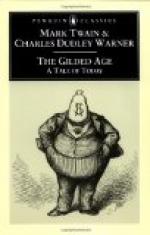They had not been in the field over two weeks when Harry wrote to his friend Col. Sellers that he’d better be on the move, for the line was certain to go to Stone’s Landing. Any one who looked at the line on the map, as it was laid down from day to day, would have been uncertain which way it was going; but Jeff had declared that in his judgment the only practicable route from the point they then stood on was to follow the divide to Stone’s Landing, and it was generally understood that that town would be the next one hit.
“We’ll make it, boys,” said the chief, “if we have to go in a balloon.”
And make it they did In less than a week, this indomitable engineer had carried his moving caravan over slues and branches, across bottoms and along divides, and pitched his tents in the very heart of the city of Stone’s Landing.
“Well, I’ll be dashed,” was heard the cheery voice of Mr. Thompson, as he stepped outside the tent door at sunrise next morning. “If this don’t get me. I say, yon, Grayson, get out your sighting iron and see if you can find old Sellers’ town. Blame me if we wouldn’t have run plumb by it if twilight had held on a little longer. Oh! Sterling, Brierly, get up and see the city. There’s a steamboat just coming round the bend.” And Jeff roared with laughter. “The mayor’ll be round here to breakfast.”
The fellows turned out of the tents, rubbing their eyes, and stared about them. They were camped on the second bench of the narrow bottom of a crooked, sluggish stream, that was some five rods wide in the present good stage of water. Before them were a dozen log cabins, with stick and mud chimneys, irregularly disposed on either side of a not very well defined road, which did not seem to know its own mind exactly, and, after straggling through the town, wandered off over the rolling prairie in an uncertain way, as if it had started for nowhere and was quite likely to reach its destination. Just as it left the town, however, it was cheered and assisted by a guide-board, upon which was the legend “10 Mils to Hawkeye.”
The road had never been made except by the travel over it, and at this season—the rainy June—it was a way of ruts cut in the black soil, and of fathomless mud-holes. In the principal street of the city, it had received more attention; for hogs; great and small, rooted about in it and wallowed in it, turning the street into a liquid quagmire which could only be crossed on pieces of plank thrown here and there.
About the chief cabin, which was the store and grocery of this mart of trade, the mud was more liquid than elsewhere, and the rude platform in front of it and the dry-goods boxes mounted thereon were places of refuge for all the loafers of the place. Down by the stream was a dilapidated building which served for a hemp warehouse, and a shaky wharf extended out from it, into the water. In fact a flat-boat was there moored by it, it’s setting poles lying across the gunwales. Above the town the stream was crossed by a crazy wooden bridge, the supports of which leaned all ways in the soggy soil; the absence of a plank here and there in the flooring made the crossing of the bridge faster than a walk an offense not necessary to be prohibited by law.




